Learn how Dr. Marine Anais Krzisch’s $35K FRAXA and ASF-funded project uses human iPSC microglia models to uncover pathways for Fragile X syndrome treatment.
Read moreOrganization
Modeling R-Loop Therapy for Fragile X Syndrome in Patient-Derived Brain Organoids

Fragile X syndrome researchers model R-loop therapy in patient-derived brain organoids to restore FMR1, accelerating a curative approach supported by FRAXA.
Read moreFRAXA-Funded Research Explores ISRIB as a Potential Treatment for Fragile X

ISRIB for Fragile X syndrome is being studied as a potential treatment to restore brain function and social behavior. Researchers investigate its effects.
Read moreInvestigating the Role of the Insulin Degrading Enzyme (IDE) in Fragile X Syndrome
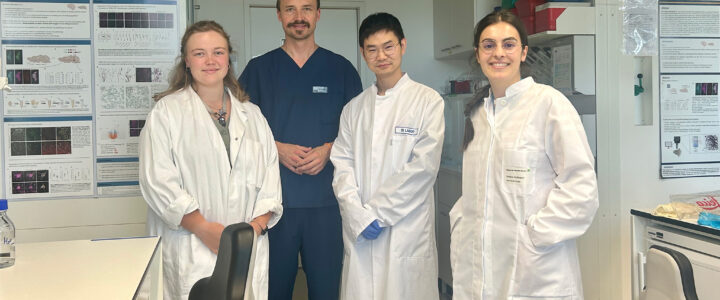
FRAXA Research Foundation awards a $100,000 grant to Ludwig Maximilian University researchers to investigate the role of insulin-degrading enzyme (IDE) in Fragile X syndrome, exploring new therapeutic approaches for cognitive and metabolic challenges in FXS.
Read moreAltered Physiology of Primary Visual Cortex in Fragile X Syndrome
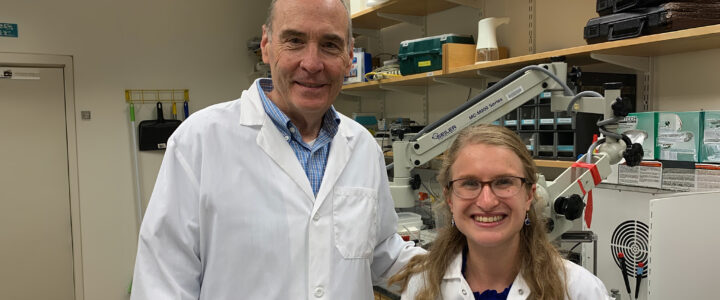
Discover how a $100,000 FRAXA grant supports research at MIT targeting neuron dysfunction in Fragile X, aiming to develop new therapies to improve sensory processing and behavior.
Read moreGene Editing of FMR1 to Correct FXS Phenotypes in Mice

FRAXA awarded a $100,000 grant to Dr. Davidson and Dr. Yrigollen at Children’s Hospital of Philadelphia to explore gene editing tools aimed at treating Fragile X syndrome by correcting FMR1 mutations in a unique mouse model.
Read moreFragile X Unplugged: Establishing Mobile EEG as the Next Frontier

Discover how a $100,000 FRAXA grant awarded to Cincinnati Children’s Hospital is advancing Fragile X research by simplifying EEG technology for home use, improving clinical trial accessibility and efficiency.
Read moreIdentification of the Proteome of Active and Silenced FMR1 Alleles in Human Stem Cells

This team’s ultimate goal is to find a way to restore full function of FMR1, the gene which underlies Fragile X syndrome. With this grant, they will use advanced technologies to find the specific proteins that are involved in keeping FMR1 silenced. Understanding precisely why and how the gene is silenced is a key step toward finding a solution.
Read moreTo Interrogate the Developmental Timing for Treating Fragile X Syndrome

Are there critical periods in Fragile X syndrome? Will treatment work in adults as well as in children? This team aims to answer these questions.
Read morePharmacologically Activating mGluR7 as a Novel Therapy for Fragile X Syndrome

Join Dr. Tsai and Dr. Kumar on a journey into novel treatment avenues for Fragile X syndrome. Learn how activating mGluR7 could be a game-changer, opening up uncharted therapeutic territory.
Read moreRecruiting: Unveiling Probiotic Potential in Fragile X Syndrome Clinical Trial

First of its kind in Serbia, this clinical trial explores probiotic intervention as a potential treatment avenue for Fragile X syndrome.
Read morePharmacological Modulation of Nicotinic Signaling
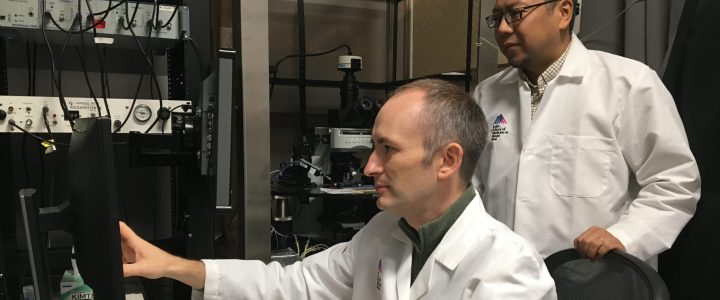
Nicotine — familiar to any smoker — tickles nicotinic acetylcholine receptors in the brain. These receptors are key to important brain functions including learning and memory. This team will explore whether drugs that dampen these receptors can improve cognitive function in Fragile X.
Read moreAstrocyte Contribution to Sensory Hypersensitivity in Fragile X Syndrome
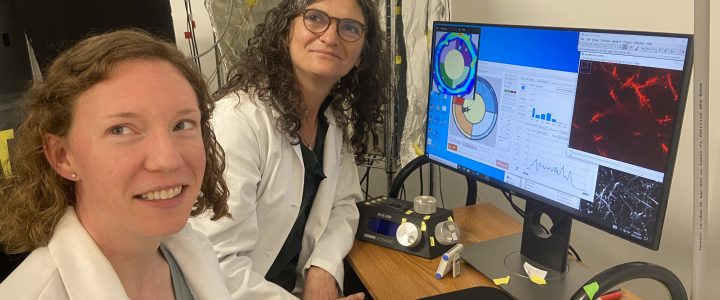
Most Fragile X research has focused on one type of brain cells: neurons. But mounting evidence point to problems with astrocytes, star-shaped cells which are vitally important to normal brain function. This team is working to understand how astrocytes are involved in Fragile X and develop treatment approaches that targets astrocytes alone.
Read moreReactivating the FMR1 Gene to Reverse Fragile X Syndrome

FRAXA Research Foundation is dedicated to funding breakthrough research, providing $240,000 to reactivate the FMR1 gene to combat Fragile X Syndrome, with the goal of restoring vital protein function and advancing towards a cure.
Read moreC-subunit Mitochondrial Leak Channel in Fragile X Syndrome

Explore Yale’s groundbreaking study on mitochondrial leak channels, set to revolutionize Fragile X syndrome treatment. Funded by a $100,000 FRAXA grant.
Read moreSomatosensory Processing as a Therapeutic Target for Fragile X Syndrome

Awarded a FRAXA Research grant, Dr. Andrew Stanfield, Dr. Leena E. Williams, and Dr. Damien Wright are set to explore somatosensory processing (sense of touch) in Fragile X syndrome at the University of Edinburgh. Their aim? A noninvasive touch test that could set the stage for future clinical trials in FXS.
Read moreAntisense Oligonucleotides (ASOs) to restore FMRP in Human Fragile X Cerebral Organoids

Explore Dr. Richter’s encouraging results with ASOs for Fragile X syndrome. A $100,000 grant now fuels pivotal studies needed to advance toward ASO therapy.
Read moreSlack Potassium Channel Inhibitors to Normalize FMR1 Knockout Mice

Learn how a $100,000 FRAXA research grant supports Yale researchers in using Slack potassium channel inhibitors to treat Fragile X syndrome by normalizing behaviors in FMR1 knockout mice.
Read moreRoles of Postnatal Transient Connectivity in the Development of Fragile X Syndrome
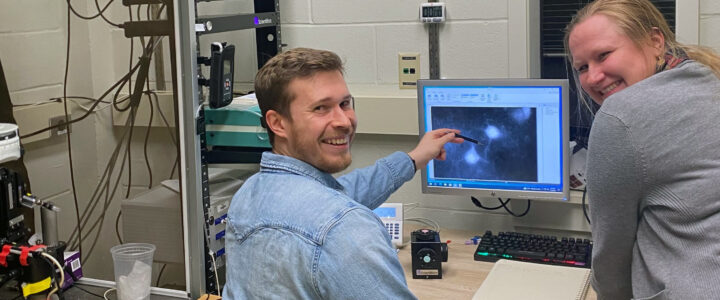
A $100,000 FRAXA research grant awarded to Gabrielle Pouchelon, PhD, and Dimitri Dumontier, PhD, at Cold Spring Harbor Laboratory fuels groundbreaking research on Fragile X syndrome. Their work focuses on understanding sensory sensitivities and developing a noninvasive screening method, a potential game-changer for families affected by Fragile X syndrome.
Read moreA Tat-Conjugate Approach to Treat Fragile X Syndrome

Explore Turner Lab’s novel approach to developing definitive treatment for Fragile X syndrome with a Tat-conjugated, truncated FMRP protein. This innovative strategy aims to restore brain circuit function and reduce abnormal behaviors linked to Fragile X by directly addressing the cause of Fragile X: a missing protein.
Read moreThe Endocannabinoid System and Fragile X Syndrome

Explore groundbreaking research on the potential of Cannabidiol (CBD) in modulating the endocannabinoid system for Fragile X syndrome therapy. Discover how CBD could change the natural course of Fragile X.
Read moreModeling Fragile X Syndrome using Multi-Region Human Brain Organoids

Discover groundbreaking research at UCI by Dr. Watanabe and Dr. Tsai. Using cutting-edge organoid technology, they’re modeling Fragile X brain function and advancing potential treatment testing.
Read moreSRC Family Kinase Inhibitor as a Potential Treatment for Fragile X Syndrome
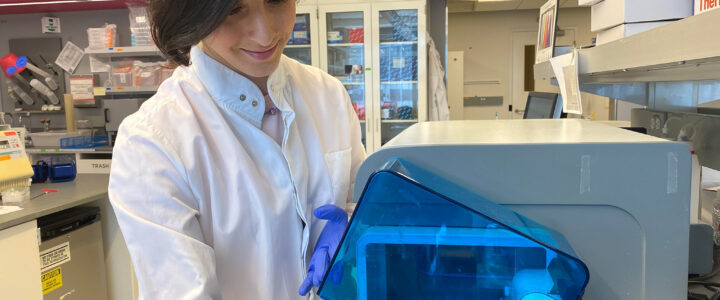
Discover the Smith lab’s new approach to treating Fragile X syndrome using Saracatinib, originally a cancer drug. Learn how this $100,000 FRAXA research grant-funded study opens up hopeful avenues.
Read moreUsing Exosomes to Discover Fragile X Biomarkers

How can a blood test give an accurate picture of brain activity? With this grant from FRAXA, Dr. Martire and Dr. Boussadia will try to use unique particles called exosomes – which can travel from brain cells to the blood stream – to evaluate the effects treatments are having on the brain.
Read moreValidating Novel Inhibitors of ERK Signalling to Treat Fragile X Syndrome

One promising treatment approach for Fragile X syndrome is to inhibit on a neuronal pathway, ERK. ERK inhibitors are also being studied as treatments for other disorders including autism.
This team has conducted pilot studies showing that ERK inhibitors are very effective in reversing signs of disease in Fragile X mice. With this grant from FRAXA they will take the next steps toward possible clinical trials of an ERK inhibitor for individuals who have Fragile X syndrome.

